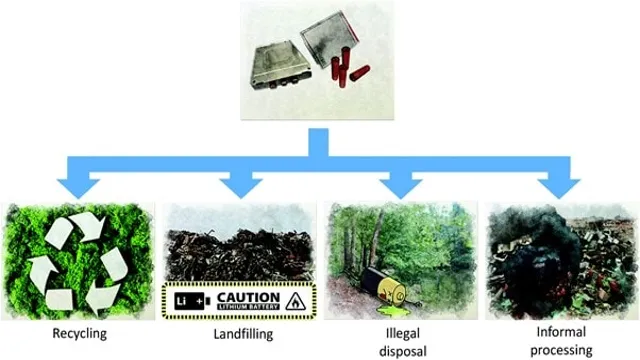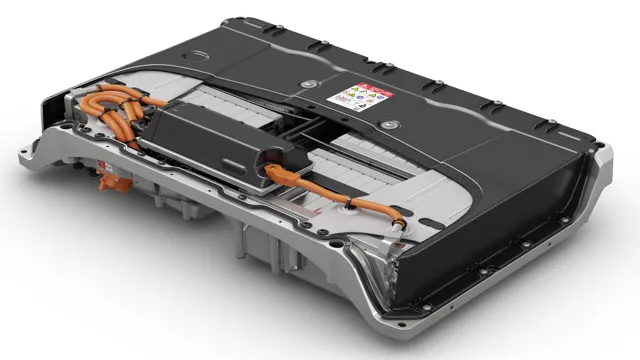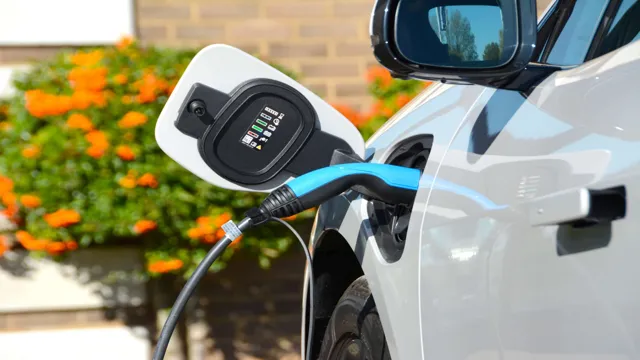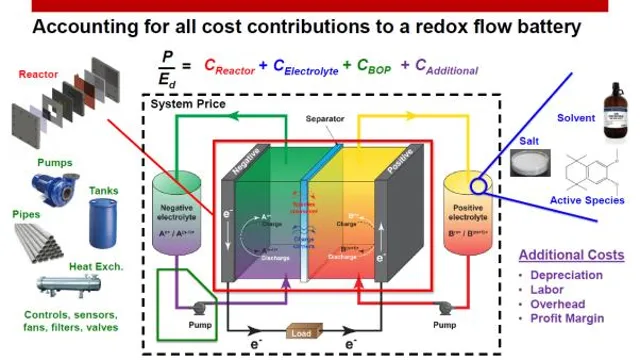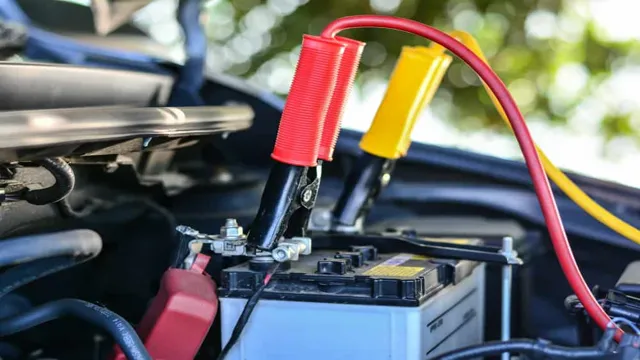Revolutionizing the Future: United States Implements Sustainable Plan for Electric Car Battery Disposal
Electric cars are becoming increasingly popular due to their sustainability and efficiency. However, this rise in popularity brings up a critical question; what happens to electric car batteries once they are no longer useful? The disposal of electric car batteries in the US has become a pressing concern for environmentalists and the car industry. With the influx of electric cars coming to market and the need for proper battery disposal, the US government and car manufacturers are finding ways to safely dispose of these batteries while minimizing their environmental impact.
In this blog post, we’ll dive into the challenges and solutions involved in safely disposing of electric car batteries in the US.
Current Disposal Situation
The increasing popularity of electric cars has led to a serious issue regarding the disposal of their batteries. The United States currently does not have a long-term plan for the proper disposal of these batteries, which contain toxic materials that can harm the environment if not disposed of correctly. As the demand for electric cars continues to rise, it is crucial to find a solution to this problem.
While some companies are taking steps to address the issue by offering recycling and disposal services, there is still a long way to go. The government must take action and develop a comprehensive plan to ensure the safe and responsible disposal of electric car batteries. It is essential not only for the environment but also for the health and safety of people involved in the recycling and disposal process.
Therefore, we need to support initiatives that encourage sustainable practices and demand accountability from companies and policymakers. If we don’t take the necessary steps now, we will face much greater problems in the future.
Growth of Electric Cars in US
As the demand for electric cars in the US continues to rise, the challenge of disposing of their batteries looms large. While electric vehicles (EVs) have been lauded for their environmentally friendly nature, their batteries contain toxic substances such as lead, cadmium and lithium, which need to be recycled or otherwise disposed of safely. The good news is that several companies are stepping up to tackle this challenge.
For example, startups such as Redwood Materials and Li-Cycle are developing new recycling techniques to ensure that EV batteries are repurposed, preventing the materials from ending up in landfills. Meanwhile, automakers such as Tesla and General Motors are investing in closed-loop recycling systems to reduce waste and minimize environmental impact. With these efforts, it is hoped that the disposal of EV batteries can be tackled in a sustainable and responsible manner, allowing us to enjoy the benefits of electric mobility while protecting our planet.
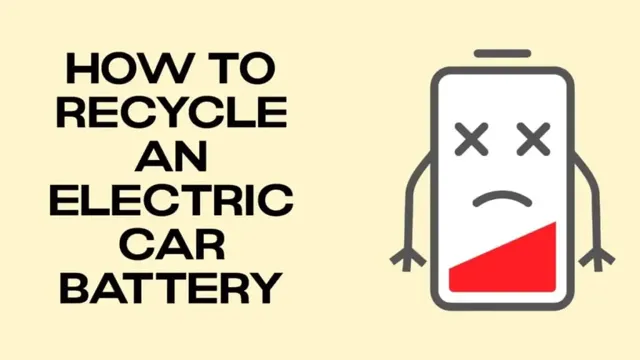
Issues With Current Disposal Methods
The current disposal situation is a pressing issue that cannot be ignored. Many of the current disposal methods have serious drawbacks that can cause harm to the environment and human health. One of the primary issues with current disposal methods is that they often involve burying waste in landfills.
This can lead to soil contamination and groundwater pollution, which can have serious consequences for the environment and for human health. Another issue with current disposal methods is that they often involve incineration, which can release harmful gases into the atmosphere. This can lead to air pollution and respiratory issues for those living in the vicinity of the incinerator.
In addition, many of the materials that are disposed of in landfills or incinerators can be recycled or repurposed, which means that valuable resources are being wasted. It’s clear that new disposal methods must be developed to address these issues and ensure a sustainable future for our planet.
Government Involvement
The United States government has been actively involved in formulating electric car battery disposal plans. With the rise in popularity of electric vehicles, the safe disposal of their batteries has become a growing concern. The federal government has taken steps to address this issue, including providing funding for research into battery recycling and implementing regulations for battery manufacturers.
Additionally, some states have created their own programs to encourage battery recycling and safe disposal. However, there is still much work to be done in this area. The government is continuing to work with stakeholders to find new solutions for electric car battery disposal that are both environmentally responsible and economically feasible.
As electric vehicles become more mainstream, it will be important to ensure that their batteries are handled responsibly throughout their entire life cycle.
EPA Regulations for Battery Disposal
Battery Disposal Regulations The US government, through the Environmental Protection Agency (EPA), has formulated regulations for the disposal of batteries to minimize their environmental impact. The regulations cover batteries used in electronic devices, such as laptops and smartphones, as well as car batteries, which can be especially harmful due to their large size. One regulation requires that batteries be marked with information about their disposal.
The label provides instructions on how to dispose of the battery safely, and it also includes a symbol indicating that the battery should not be thrown in the trash. This label ensures that batteries are handled correctly, reducing their risk of polluting the environment with toxic chemicals. Recycling companies must also obtain permits to handle batteries, thus ensuring that they are properly disposed of.
These regulations aim to protect the environment and encourage manufacturers to design batteries that are easier to dispose of after their useful life. As consumers, we also have a role to play by properly disposing of batteries and taking them to recycling centers. By doing so, we contribute to a safer and cleaner environment.
State Regulations and Programs
State regulations and programs play a crucial role in ensuring the smooth operation of businesses within their jurisdiction. The government creates policies and measures to regulate the behavior of businesses and protect the interests of consumers. Some of these regulations include zoning laws, licensing requirements, environmental regulations, labor laws, and taxes.
Additionally, the government offers various programs to support small businesses, such as grants, loans, and training programs. These initiatives are designed to help entrepreneurs start and grow their businesses while contributing to the overall economic development of their community. However, complying with these regulations can be burdensome for small businesses, and failure to do so can result in penalties or legal action.
It is, therefore, essential for entrepreneurs to be aware of these regulations and programs and seek professional advice to ensure compliance. Overall, the government’s involvement in regulating and supporting businesses creates a conducive environment for sustainable economic growth.
Private Sector Initiatives
When it comes to private sector initiatives, government involvement is crucial. Governments have the power to create policies, regulations, and incentives that can drive private sector innovation and investment towards sustainable solutions. For instance, governments can provide tax incentives for companies that invest in renewable energy or penalize those that pollute the environment.
Governments can also create regulations that mandate companies to follow sustainability standards or disclose their environmental impact. Furthermore, governments can partner with private sector players to co-invest in innovative projects that address environmental challenges like climate change, pollution, and resource depletion. Collaboration between governments and the private sector can amplify the impact of sustainability initiatives and help achieve shared goals.
It is, therefore, important for governments to take an active role in promoting private sector initiatives for a sustainable future.
Future of Electric Car Battery Disposal
Looking at the future of electric car battery disposal in the United States, it is clear that the issue is becoming increasingly pressing. As the number of electric cars on the road continues to grow, so too does the amount of outdated or damaged batteries that need to be dealt with. The good news is that there are ongoing efforts within the industry to create a viable recycling process for these batteries.
This includes identifying new ways to extract valuable materials from the batteries and finding safe and environmentally responsible ways to dispose of any remaining waste. Of course, this is a complex issue that requires input from various stakeholders, including automakers, regulators, and environmentalists. The key will be to find solutions that balance the needs of all parties involved, while still ensuring that the environment and public safety are protected.
Ultimately, the future of electric car battery disposal in the United States will depend on the success of these ongoing efforts.
Advancements in Recycling Technology
As the popularity of electric cars continues to grow, there is an increasing concern about how to dispose of the car batteries responsibly. However, there are new advancements in recycling technology that may help resolve this issue. These new technologies include using hydrometallurgical processes, physical separation, pyrometallurgy, and other innovative methods.
These recycling methods aim to extract valuable metals like lithium, nickel, and cobalt from the batteries and repurpose them into new batteries or other industrial applications. In addition, some companies are finding ways to extend the life of electric car batteries, reducing the need for disposal. By investing in these technologies and recycling methods, we can make electric cars more sustainable and create a circular economy where materials are reused instead of discarded.
The future of electric car battery disposal is looking bright, and we can all contribute to a cleaner and greener planet by choosing sustainable transportation options.
Collaboration Between Government and Private Sectors
Collaborating between the government and private sectors is critical for the future of electric car battery disposal. This partnership will ensure the safe and efficient recycling of these batteries, reducing the environmental impact of disposing of this hazardous waste. The private sector has the expertise and resources to develop innovative solutions for battery disposal while the government can provide regulations, incentives, and investment.
Together, they can create a sustainable and profitable industry that benefits both the economy and the environment. Electric car batteries contain valuable materials such as lithium and cobalt that can be reused in new batteries, reducing the demand for mining and minimizing the waste. Thus, by collaborating, the government and private sectors can pave the way for a cleaner and greener future.
Conclusion
It’s time to plug in and power up a smarter future for electric car batteries disposal in the United States. We can no longer afford to treat these valuable resources as waste and ignore their impact on our environment. Through collaboration and investment in sustainable solutions, we can turn battery recycling into a profitable industry that benefits both our planet and our economy.
So let’s charge forward and ensure that responsible disposal becomes the driving force behind our electrified future!”
FAQs
What is the current status of electric car batteries disposal plan in the United States?
In the United States, there is currently no national electric car battery disposal plan in place. However, some states have taken steps to address the issue, such as California’s regulations requiring automakers to ensure the proper disposal of electric vehicle batteries.
How are electric car batteries currently being disposed of in the United States?
Currently, electric car batteries are primarily being recycled or repurposed for energy storage. However, there are concerns about the potential environmental impact of improperly disposed of batteries, which can release toxic chemicals into the environment.
What initiatives are being taken to improve the disposal of electric car batteries in the United States?
Some companies are investing in research and development to improve battery recycling and efficiency, while others are exploring new technologies to repurpose batteries for energy storage. Additionally, some states are implementing regulations to ensure proper battery disposal, and some companies are establishing take-back programs to collect and recycle used batteries.
What are the potential environmental and health risks associated with improper electric car battery disposal?
Improper disposal of electric car batteries can lead to the release of toxic chemicals such as lead, cadmium, and mercury, which can contaminate soil and groundwater. In addition to the environmental risks, improper disposal can also pose a health risk to workers involved in the disposal process.
